 |
Ceduna Area SchoolA community of respectful, resilient and responsible learners |
Contact Us | School Pride Gallery | Downloads
|
 |
Ceduna Area SchoolA community of respectful, resilient and responsible learners |
Contact Us | School Pride Gallery | Downloads
|

Students at Ceduna Area School engage in a range of authentic and dynamic arts based projects from Reception to year 12. From Reception to year 5 students are involved in a wide range of activities which introduce students to arts and craft based practices. Focusing on skill development and creative expression, early years arts education is a fun, experimental and absorbing process for our students.

In the middle years of school students attend specialist arts lessons in the Art Room which is a purpose built arts facility. This facility offers our 6 to 12 students the opportunities to continue to develop their artistic skills, creative expression and theoretical understanding of the arts.
The arts program at Ceduna Area School is designed to facilitate learning through, drawing, colour theory, graphic design, painting, printing, sculpture, digital art and media experimentation.
Students develop an understanding of historical and contemporary art movements through analyzing artworks, exploring a variety of mediums and learning different production techniques. These skills are taught throughout our Arts program to ensure our students have an awareness and ability of the skills required to succeed in the Visual Arts program at SACE Stage One and Stage Two level.
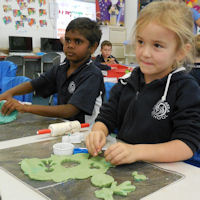
Design and Technology covers a range of subjects offered at Ceduna Area School such as Digital Photography, Metalwork and Woodwork. These subjecst allow students to gain knowledge and insight into the competing priorities and trade-offs within the designed world.
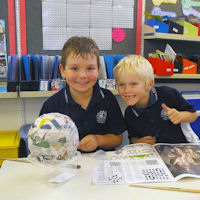
Digital Photography students develop image manipulation techniques. Students develop the techniques for talking visually effective photographs. Students will apply these techniques to produce a 12 month calendar.
Technical Studies students at Ceduna Area School are given the opportunity to work with metals, plastic or wood. Woodwork students investigate a range of equipment and timber products and how they may be worked together to produce integrated design solutions. Students use portable power tools and make various wood items such as chopping boards.
Metalwork involves study of the general cutting and welding of ferrous metals and the types of projects produced will be negotiated depending on cost and suitability. Students undertake project costing and use technical drawing skills as a part of the design process.
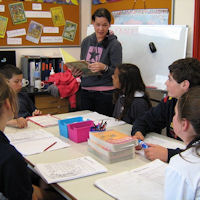
Subjects in the English Learning Area have a common focus on the exploration and development of English skills, strategies, knowledge, and understanding, for a variety of purposes. The study of English provides students with a focus for informed and effective participation in education, training, the workplace and their personal environment.
At Ceduna Area School, we offer three different subjects at Stage 1 – English, English Pathways and Literacy for Work and Community Life. Stage 1 English allows a wide choice in texts and negotiated responses. The subject offers opportunity for students to create their own texts. It is preparatory to English Communications in Stage 2.

English Pathways helps students to develop their personal and social identity through the examination of texts. Students read, listen, speak, respond to and compose texts, to establish and maintain connections with familiar and unfamiliar personal, social, cultural and/or vocational contexts. The study of Literacy for Work and Community Life allows students to develop their skills in literacy, while engaging with a range of familiar and unfamiliar texts related to work and community life. Learning is centred on practical activities and develops spoken and written language skills. Students develop skills to interact effectively with others utilising a range of modes for both work and community life.
At Stage 2, Ceduna Area School offers 2 subjects - English Communications and English Pathways. English Communications develops both an appreciation and understanding of a range of texts, and the ability to respond to these in a variety of forms. There is a strong focus on developing oral and written communication skills for a range of audiences and purposes. English Pathways provides the opportunity for teachers and schools to develop programs that suit the local needs of students.

Students at Ceduna Area School can elect Food & Nutrition studies at a Year 8 and Year 9 level. Students participate in one single lesson and one double lesson per week. Subject content covers safety and hygiene, general kitchen organisation and familiarisation, and health and nutrition. Students explore these topics through both theory and practical activities.
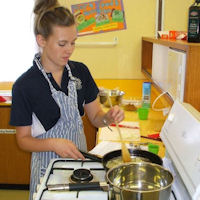
Students can elect to participate in Food & Hospitality in Year 10, 11 or 12. In year 10, students participate in one single and one double lesson. Subject content covers cultural flavours, techniques and celebrations that impact the way we eat in Australia. It also addresses contemporary trends and issues in society such as food wastage, food packaging, the fast food trend, food miles and the impact of social media on the food and hospitality industry.
In year 11 and year 12, also known as SACE Stage 1 and Stage 2, students further explore contemporary trends and issues in the Food & Hospitality Industry. Year 11s participate in six lessons per week and Year 12s participate in seven lessons per week.
Students are actively involved in research, planning, cooking and evaluating through individual, partnered and group assessments.
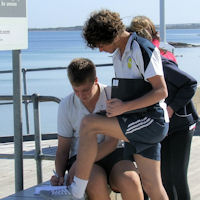
Humanities and Social Sciences is a broad term which covers a range of subjects offered at Ceduna Area School. At Year 10, students cover all four strands of the curriculum - time, continuity and change; place, space and environment; societies and cultures and social systems. Their studies involve investigating current and past social, political, economic and environmental issues. Past topics have included: Australian Identity; Asylum Seekers; Political Ideologies; Terrorism and Topographic Mapping.
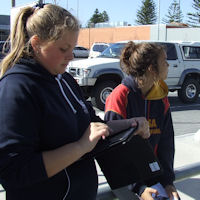
Stage 1 students choose to study Society and Culture as either a 10 credit (one semester) or a 20 credit (full year) subject. For each 10-credit subject, it is recommended that students study two topics: one with a focus on an Australian context and the other with a focus on a global context. Students and teachers negotiate topics to study within the course. Assessments involve both group work and individual work.
Stage 2 students choose from Studies of Society and Culture or Tourism. Society and Culture gives students the opportunity to make sense of a complex and rapidly changing world. Students explore and analyse the interactions of people, societies, cultures and environments. Students develop skills, values and understandings that enable effective participation in contemporary society. In Tourism, students will identify and explain the diverse nature of tourists, tourism and the tourism industry and develop an understanding of the impacts of Tourism. Contemporary issues at local, national and global levels will be analysed. There is an emphasis on a variety of communication skills and practical skills, such as researching, analysing, evaluating and reviewing which will enable students to meet the challenges of a dynamic and evolving industry.
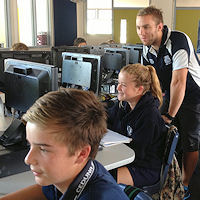
Technology-rich education increases student engagement, participation and excitement and enables anywhere, anytime learning. Ceduna Area School has a strong focus on Information and Communication Technology (ICT) literacy that enables students to be successful global citizens.
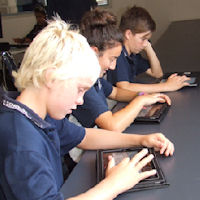
SmartTVs have been used extensively in all sections of the school. Due to the popularity and improved engagement in classrooms with SmartTVs, they have been added to all teaching areas as well as Senior School classrooms. The use of Video Conferencing for student learning and staff training and development has helped overcome the tyranny of distance.
We use Windows Tablets in our classrooms with its provision of many innovative and interactive ways to cover the curriculum while at the same time keeping the students motivated and engaged. Students use mobile devices with wireless internet access at school for a large range of activities including research, maths, literacy, music, and digital story-telling. When available, Learning Areas use digital textbooks on these devices.
Our staff continue to regularly use Moodle, Microsoft Teams, Google Classrooms, SeeSaw as learner management systems incorporating videos and podcasting in their teaching.

Mathematics is increasingly relevant to the workplace and in everyday life. The subject gives students the abilities and skills required in the workplace and in everyday life. They learn how to approach new challenges by investigating, modelling, reasoning, visualising, and problem-solving, with the goal of communicating to others the relationships observed and the problems solved. The study of Mathematics provides students with the abilities and skills to thrive now and in the future.
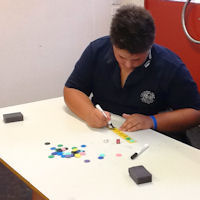
We offer 3 Mathematics subjects at Stage 1 - Mathematical Studies, Mathematical Applications and Numeracy for Work and Community Life. Mathematical Studies may be undertaken as a 10 credit or a 20 credit subject with three topics per semester. Semester A topics are Quadratic and Other Polynomials; Trigonometry and Coordinate Geometry. Semester B topics are Statistics; Models of Growth; Functions and Graphs. Mathematical Applications gives students an understanding of the 'real-life' applications of Maths. Budgeting, and other money issues are tackled preparing students for further study, or work, and for personal and community life. Numeracy for Work and Community Life has a strong focus on basic numeracy skills, making this unit particularly relevant for students who might lack recent experience or confidence in Mathematics.
Stage 2 Mathematical Applications may be undertaken as a 20 credit subject. Students undertake two topics per semester or 10 credits. Each topic includes two tests (Skills and Application Tasks) and one Investigation (Folio) with an exam at the end of each semester covering both topics.

Junior School students have lessons where all children participate in pitch, rhythm and beat. Students perform at Assemblies, Music Night and the School Concert. Students in Year 4-7 can participate in choir lessons for 1 lesson per week. The School Choir performs at various functions during the year including School Concerts and at our Regional Festival of Music held in Whyalla. Selected students from R-5 take part in the annual musical which is performed as part of our Music Night celebration. Students are involved as performers and also participate in production, PR, lighting, sound and front of house activities.
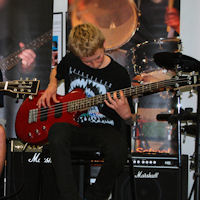
Years 6-10 students participate in group ensemble music, playing electric and bass guitars, keyboard, drums or vocals in contemporary and rock genres. The Study of Acoustics is explored in addition to notation and scale theory.
Our Stage 1 Music Advanced program investigates the development of Blues through to the Heavy Metal genre and provides a pathway to a range of Stage 2 music subjects. Stage 2 students undertake two 10 credit subjects - Music in Context and Solo Performance. Music in Context students study five Blues and six Beatles/Beach Boys songs in a historical and cultural context analysing the works using scores and recordings. Solo Performance students extend their technical and performance skills on their chosen instrument using this expertise to develop musical performance. Individual Study is also offered to self-directed learners. Our continued success in Music can be attributed to our use of mobile technologies with resources being available 24x7 on our Ceduna Moodle Site as well as the use of digital pens, podcasts, videos, ipods and tablets to help engage our students.
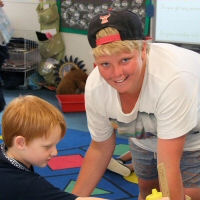
The Personal Learning Plan is a Stage 1 subject, usually undertaken in Year 10. It is worth 10 credits, and you need to achieve a C grade or higher to gain your SACE. If you have a career already in mind, the Personal Learning Plan provides a chance for you to explore university, TAFE, and apprenticeship or traineeship courses or pathways. For students who don't know what they want to do yet, the subject will give you an idea of what careers might interest you and the kinds of subjects you can study to maximise your choices in the future.

The Personal Learning Plan is your introduction to the five SACE capabilities - Citizenship, Communication, Learning, Personal Development and Work. You'll learn what capabilities you need for your future, as well as how to develop and improve them. As part of the Personal Learning Plan you'll identify your strengths and weaknesses, investigate potential pathways, and figure out how you’re going to get there. You will need to present your research as a folio. You'll also come out of the subject with a plan to get you where you want to go.
Through the Personal Learning Plan you will also learn work skills which you can apply to your current and/or future job, such as writing a resume and cover letter, or learning about professional relationships. By talking to employers and business people, you can discover what skills and attributes they look for in young people, and use these as guidelines to assist in your personal development. More information about the Personal Learning Plan can be found by clicking on the following link to the SACE website
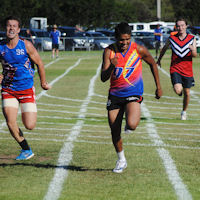
We have a thriving Physical Education department with a strong focus in Australian Rules football, Netball and Athletics starting in Reception through to Year 12. Ceduna Area School is affiliated with many different competitions that showcase our athletic talent locally, regionally and at a state level. Students have opportunities to participate in interschool athletics such as West Coast Interschool Athletics Carnival (WCIAC), Western Areas Secondary School Athletics Carnival (WASSAC) and Secondary School Sports South Australia (SSSSA). Annual Sports Days and Swimming Carnivals are held on the school grounds during Term 1 comprising separate Reception - Year 5 and Year 6 - 12 carnivals.
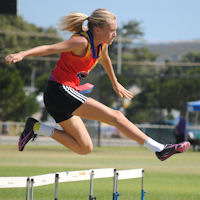
Reception to Year 5 students participate in a diverse range of sports including Athletics, Swimming, Dance, JumpRope for Heart and the Adidas Fun Run. We are also privileged to have the Port Adelaide Football Club run development clinics for year 1 and 2 students. The Tcharkulda 3km cross-country run is a favourite interschool competition
The Middle and Senior School Physical Education Curriculum is a fundamental aspect of students health and well-being. The large range of sports offered enables them to have the opportunity to compete against other schools in Lawn Bowls, Badminton, 9 A-Side Football and Surf on some of the states best waves. Middle school students are able to participate in SAPSASA in Adelaide in Football, Netball, Cricket, Tennis and Soccer. Senior School Physical Education allows students to advance from the favourite Tchkaculta cross-country run to a more advanced 5km course at Minnipa as well as the chance to be selected to represent the school at the annual Cleve Sports Championship in either Football or Netball. Our continued success is undoubtedly due to the vast range of sports and events offered at Ceduna Area School.

The Research Project is a compulsory element of the SACE which students must complete with a C or higher grade. It is usually undertaken at Stage 2.

Students choose a research topic that is based on an area of interest, and a capability (communication, citizenship, personal development, or work) that is relevant to their research. They use the research framework (described below) as a guide to developing their research and their chosen capability, and to applying knowledge and skills specific to their research topic.
Students evaluate the research processes they use, through which they demonstrate their capability for learning. Students also demonstrate and evaluate their chosen capability. The four parts of the research framework are: initiating, planning and managing the research; carrying out the research; communicating the research outcome; evaluating the research. This framework is flexible to accommodate different models and approaches to research and enquiry-based learning, and to guide each student’s research, on any topic and in any context.
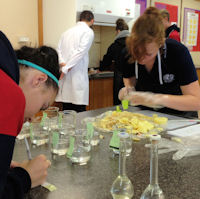
Students in Reception to Year 6 use Primary Connections as the basis for their Science lessons. Primary Connections provides an innovative and inquiry-orientated teaching and learning model, in which students develop investigation skills and an understanding of the nature of Science. The programme has undergone substantial trialling and supports the implementation of the Australian Curriculum.
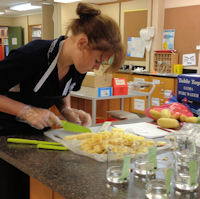
Year 7 to 10 students use the Pearson Science resource written specifically for the Australian Curriculum. It has three interrelated strands: Science Understanding, Science as a Human Endeavour, and Science Inquiry Skills. The four areas covered within the curriculum are Biological Science, Chemical Science, Earth and Space Science and Physical Science.
Senior School students can choose to study particular areas of Science. At Stage 1 and 2 we currently offer Biology and Physics. Biology is the study of life, what life needs to survive, what makes life possible, how life evolves and changes, and how life forms interact with one another. Students design and conduct biological investigations and gather evidence from their investigations.
Physics, the most fundamental of all sciences, is about the nature of basic things such as motion, forces, matter, heat, sound, light and the structure of atoms. Topics include Work and Energy, Waves, Motion, Forces and Electric Fields. Students demonstrate evidence of their learning through assessment types: - Investigations Folio and Skills and Applications Tasks.